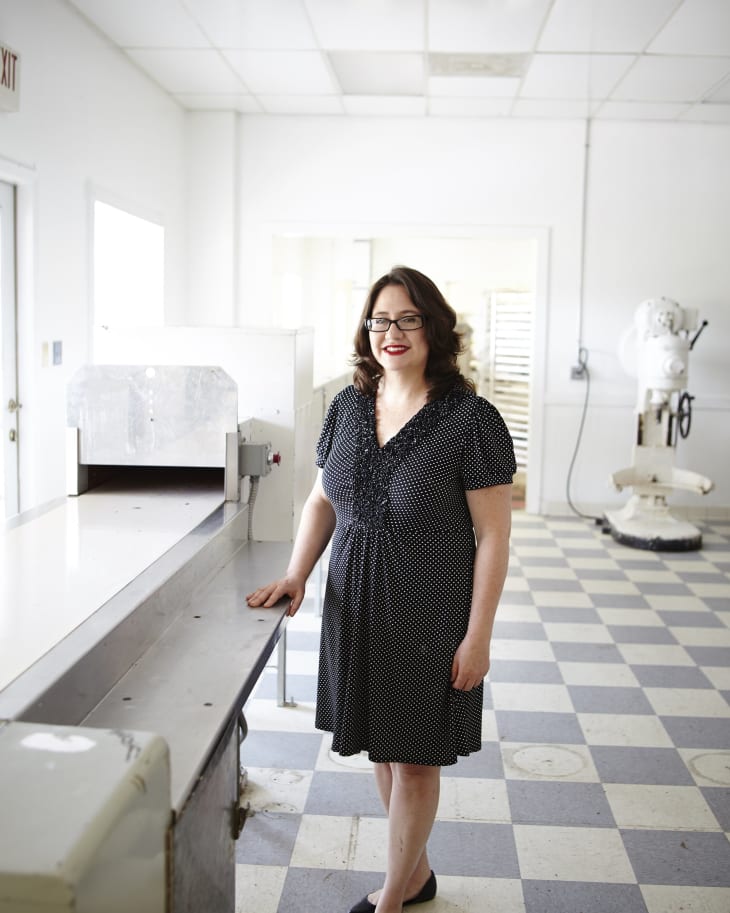This Tiny Candy Company Is Making Wildly Popular Allergen-Free Sweets in Alabama
Who: Hanson Watkins, owner of Indie Candy
What: Big-Eight Allergen-Free Confectioners
Where: Birmingham, Alabama
Hanson Watkins knows a thing or two about the candy business. “There used to be a candy maker in every town in the United States – maybe two,” she explains, as we walk through the triple-storefront workspace of her company, Indie Candy. “Now most of the candy in the US is made by one of three companies, and it’s all done on an industrial scale.” Which is great if you’re interested in a pack of Twizzlers for a dollar, but Watkins has a slightly more ambitious goal.
Trained as a chef, and after a career in healthcare marketing, Watkins received a diagnosis of celiac disease right after she began dealing with one of her son’s allergies, and a business model was born – albeit in stages. When she began creating her first allergen-free candies, an all-natural gummy, she was working in her own kitchen. Then, in a quest to increase production, she looked further afield.
“We couldn’t even co-produce (have them made by another company) because of the risk of cross-contamination,” she explains, so she drove twice a week to Florence, Alabama, to use a co-kitchen there. Wanting to bring her work closer to her Birmingham base, she found a patch of land in a burgeoning industrial park, planning to build from scratch. Then fate (in the form of two closed restaurants across the street) intervened.
Now Indie Candy occupies three connected storefronts in a small strip mall – ironically ones with no walk-in customers. “We had to take the sign down on the door, because people were just walking in looking for candy, and we’re not set up that way.” What they are set up for is the creation of amazing, allergen-free sweets, the ingredients for which Watkins sources obsessively. She boils sugar on a refurbished, 100-year-old gas burner, and mixes with a giant antique mixer that stands guard over the enrobement line.
“Our market is about 25% kids, and 75% adults; I thought it would be exactly the opposite [when we started]” she says. Still, she gets one or two letters or emails a week from a parent. “Easter is our biggest season and we get letters saying ‘My child could never have an Easter basket before this. Thank you so much.'”
The adult portion of the business – lush chocolate truffles, handmade marshmallows – continues to surge, propelled by experiments by Watkins and her crew. Sometimes it gets out of hand, like a rosewater-flavored marshmallow they created as an experiment. “It was so good, but it was too exotic. It would never sell,” she laments. “We go on these crazy inventive binges – this is not appropriate behavior for a wholesale business! But I work with creative people, so … ”
Appropriate or not, Indie Candy continues to grow. Currently carried in stores across the South, including V Richard’s in Birmingham, The Wharf General Store in Destin, and The Merchantile in Atlanta, Watkins’ biggest mover continues to be – appropriately for an old-fashioned confectioner – word of mouth. Their website delves extensively into the list of diets that Indie Candy caters to – dairy-free, egg-free, paleo, and Feingold among them – and continues to break new ground, as in their recent expansion into corn-free candies. “A lot of people are concerned about GMO corn, and we are one of the few companies making things like corn-free gummies and marshmallows.”
Watkins is upbeat about the future of the business, as more people become aware of the quality of ingredients in their food and treats. Her proudest moment came in 2012, when Indie Candy won a Sofi, the award given by the Specialty Food Association. Rather than a victory in the “allergen-free” category, Indie Candy won in the “confection” category – the equivalent of a documentary winning Best Picture – and Watkins couldn’t be more pleased.
“Good candy is for everyone!” she exclaims.
5 Questions for Hanson
1. You talk about Indie Candy being a confectioner, not a candy maker. What is the difference?
At Indie Candy we do not make our own chocolate — we source it from a big-eight allergen-free vendor, which is difficult to do. They can’t process any form of allergen in their own facility or we can’t use their chocolate. There are a few bean-to-bar candy makers around, but they are pretty rare.
2. What is your favorite part of confectionary?
Trying to make new flavors. We have a ball creating all kinds of exotic marshmallows, for instance, but a lot of them are too esoteric and won’t sell. It means I get to eat them all without guilt, though, because we won’t make it again.
3. Are you tempted to just eat candy all day long?
I’m pretty careful with my diet, because I have celiac, and I recently lost about 20 pounds doing a sort of paleo-primal thing. Primal with candy. Always candy.
4. What is the next big challenge for you?
We’ve recently started corn-free candies, and we are doing a lot of work with natural colors. They’re hard. You have to work with the color, not the other way around.
5. What’s on the menu for today?
My kids are at the babysitter, so I’m debating lunch out. I don’t get the day off very often! Maybe I’ll get some Mexican food.
Thanks, Hanson!
